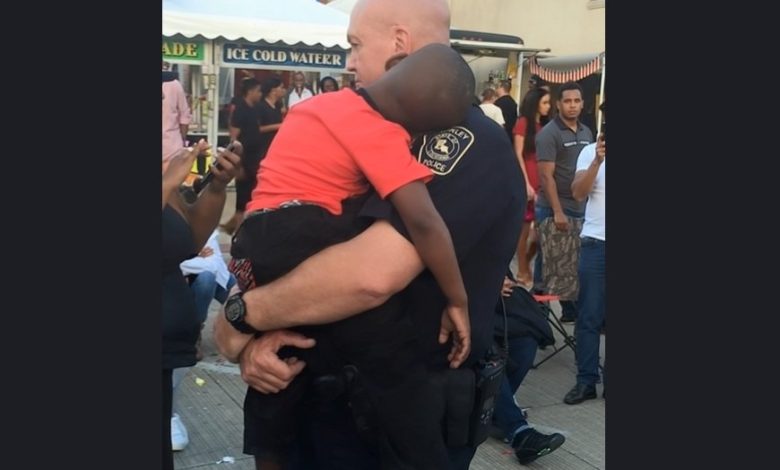He Fell Asleep in a Police Officer’s Arms—But That’s Not Why People Whispered

The Day My Nephew Fell Asleep in a Police Officer’s Arms—and the Questions That Followed
It happened during the Juneteenth festival—music pulsing through the streets, food trucks lined up, and kids running wild with joy. The whole neighborhood had shown up.
I looked away for just a moment to pay for a funnel cake. When I turned back, my nephew Zavi was gone.
Panic hit me like a freight train. I dropped everything, yelling his name, searching every bounce house, every vendor line, every tiny face in the crowd. My heart pounded in my throat. I was seconds away from calling 911 when I saw him—curled up, fast asleep, in the arms of a police officer.
The officer stood calmly off to the side, holding Zavi like it was the most natural thing in the world. When I rushed over, breathless and trembling, he met me with a nod and a soft explanation.
“He wandered off near the snow cone truck and got tired. Didn’t want to leave him alone.”
I hugged Zavi tight, thanked the officer, and tried to brush it all off. But behind me, people were whispering. Phones out. Some smiling—but others… not.
A woman near the food stand muttered, “Must be nice to get that kind of response.”
At first, I didn’t understand. Then it hit me.
They weren’t commenting on Zavi falling asleep.
They were commenting on who was holding him—and how different that scene might’ve looked if Zavi had been older, taller, less “innocent.”
The question burrowed into me that night and wouldn’t let go.
Would my nephew have been safe if he didn’t look so small, so harmless, so tired?
The officer’s name was Davies. He was kind. Gentle. He handed Zavi over with care. It felt like the end of a scary moment.
But the comments, the glances—they told a different story. One tangled in race, bias, and perception.
What if Zavi hadn’t been asleep, but scared and crying? What if he’d been a 14-year-old boy instead of a 4-year-old? Would Officer Davies have responded with the same calm presence? Or would suspicion have replaced concern?
I talked to my sister about it the next day—Zavi’s mom. She’d heard the whispers too. We both knew the truth that hung between the lines.
Zavi’s skin color mattered in that moment.
We weren’t angry—but we were aware. So, we did something.
We shared our story on social media, praising Officer Davies for his kindness, but also acknowledging the unspoken tension that rippled through the crowd. We wanted to start a conversation—not to blame, but to open eyes.
The post went viral. Comments poured in—some supportive, some defensive, others painfully honest. And one, surprisingly, came from Officer Davies himself.
He thanked us for our words. He said he understood the concerns. That he wanted the conversations to happen.
That led to an unexpected outcome. The local police department reached out. They wanted to use our story in their community training sessions. They invited us to speak at a town hall meeting.
Standing in front of that room, telling our story, wasn’t easy. There were tense moments. Disagreements. Honest, uncomfortable truths.
But there was also listening. Real listening.
Officer Davies spoke, too. He talked about what it meant to serve the community, and the importance of being aware of how actions are perceived—especially by people who carry historical fear and trauma.
It wasn’t a fairy tale ending. But it was a start.
A small, human bridge built out of a single act of kindness and the courage to examine it from every angle.
Officer Davies kept showing up. He helped launch youth outreach events. He pushed for more bias training within the department.
And we kept speaking. Not as activists, but as neighbors who chose to face something hard together.
Zavi is still the same bright, energetic little boy. Oblivious, for now, to the complex moment he slept through.
But one day, we’ll tell him.
We’ll tell him about the kind officer who kept him safe.
We’ll tell him about the whispers, the truths, the fears.
And we’ll teach him to see the world clearly—its beauty, its cracks, and his power to be part of the change.
Because even in moments of fear and uncertainty, there’s an opportunity for growth.
Sometimes, it starts with a small voice. A quiet question.
And sometimes, it starts when a child falls asleep in the arms of someone unexpected.